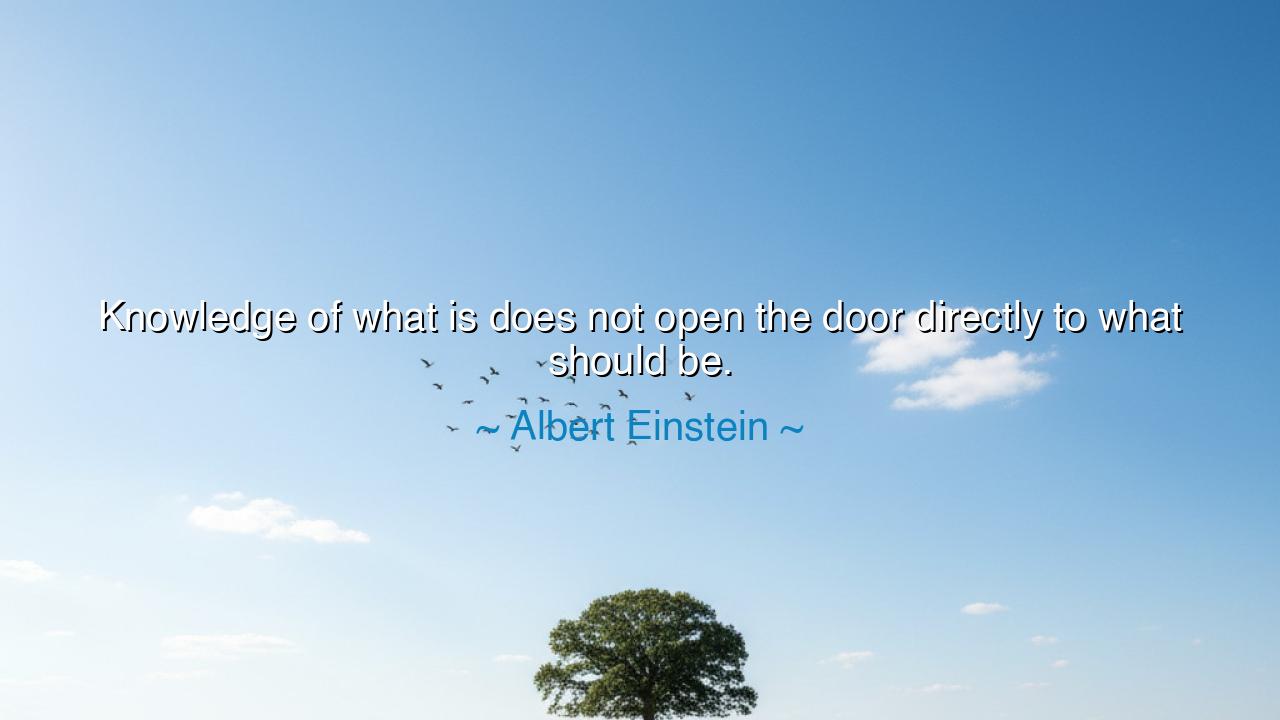
Knowledge of what is does not open the door directly to what






“Knowledge of what is does not open the door directly to what should be.” — Albert Einstein
Listen well, O seeker of understanding, for these are the words of Albert Einstein, that luminous mind who pierced the veil of the universe to glimpse its hidden order. Yet even he — the great revealer of cosmic laws — bowed in humility before a truth beyond science: that knowledge of what is — the facts, the measurements, the laws of nature — does not by itself reveal what should be, the realm of morality, goodness, and purpose. For to know the workings of the stars is one thing; to know how to live among them is another. The mind may uncover how the universe moves, but only the soul can decide where it ought to go.
The origin of this wisdom comes from Einstein’s deep reflection on the relationship between science and ethics. He saw a world intoxicated with discovery — mankind had split the atom, crossed the skies, conquered disease — yet still stumbled blindly in moral darkness. In his time, as in ours, knowledge advanced faster than conscience. The age of invention had given birth not only to miracles, but to horrors: bombs of fire, wars of pride, and weapons of thoughtless destruction. Thus, Einstein reminded humanity that knowledge, for all its brilliance, is but a tool — it describes what is, but it cannot teach us what ought to be. The heart must still lead where the intellect cannot.
For knowledge is like a lamp — it lights the path before you, but it cannot tell you which road to walk. It can describe the force of gravity, but not the weight of compassion; it can measure the speed of light, but not the value of love. A man may know the science of medicine, yet use it to heal or to harm. A nation may master technology, yet use it to build homes or destroy cities. Knowledge gives power, but wisdom gives direction. The first tells us what is possible; the second tells us what is right. Without wisdom, knowledge becomes a sword in the hand of a child.
Consider, O listener, the tale of the scientists of the Manhattan Project. They were among the most brilliant minds of their age — men who unlocked the secrets of the atom and unleashed the fire of the sun upon the earth. They knew what is: the binding energy of matter, the chain reaction of uranium, the calculations of destruction. But they did not yet know what should be. When the bombs fell upon Hiroshima and Nagasaki, many wept — not from ignorance, but from understanding too late the moral weight of their knowledge. They had opened the door to immense power, yet the key to wisdom had not been turned. In that moment, Einstein’s words — uttered years before — rang with terrible prophecy.
Yet take heart, for Einstein did not speak these words in despair, but as a call to balance. He saw that knowledge and morality are like the two wings of a bird — one alone cannot fly. The intellect must forever serve the conscience, just as science must bow to humanity. For knowledge gives us the tools to shape the world, but values give us the reason to shape it well. It is only when the mind and the heart walk together that civilization moves forward in peace. The wise do not reject learning — they sanctify it with virtue.
The lesson, then, is this: learn all you can, but never mistake learning for wisdom. The scholar who knows the nature of things must also learn the nature of good. When you seek truth, do not stop at what is — continue toward what ought to be. Ask not only, “How does this work?” but also, “How shall I use it?” For the world will always praise cleverness, but it is goodness that redeems it. Be not content to know the mechanics of life; strive to know its meaning.
Let your knowledge be the servant of your conscience. Let your discoveries serve compassion, your reasoning serve justice, your strength serve peace. Teach your children not only to think, but to care. Build, invent, and explore — but always with reverence for life and love. For the universe will never tell you what should be; that secret is written only in the human heart. And when the light of knowledge joins the warmth of virtue, then — and only then — will mankind stand worthy of the wisdom it has gained.
So remember Einstein’s warning and his hope: to know the stars is wondrous, but to walk among them with kindness — that is destiny. Knowledge of what is opens the eyes, but only vision of what should be opens the soul.






AAdministratorAdministrator
Welcome, honored guests. Please leave a comment, we will respond soon